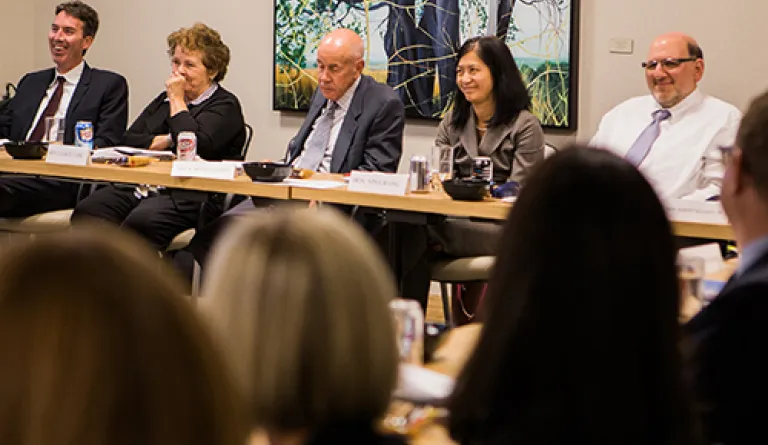Judges Receive Helpful Feedback from Civil Attorneys and Corporate Counsel

On October 5, 2016, I was honored to be a panelist at IAALS’ joint Law Firm Council and Business Leadership Network meeting. There were three panels at this plenary session: 1) a panel of corporate in-house counsel; 2) a panel of outside counsel; and 3) a panel of judges (from both the federal bench and the state bench). Each panel provided the other two panels feedback in the context of achieving a just, speedy, and cost-effective civil justice system.
As a member of the panel of judges, I was pleasantly surprised by everyone’s candor. More importantly, I was impressed by the attorneys’ informative, thoughtful, and helpful comments. Attorneys and judges alike tend to be very busy and, as a result, fail to take the time to communicate with each other as often as would be ideal. The exchange of ideas at last week’s event proves just how constructive feedback can be for both judges and attorneys. It was certainly an educational meeting for me. I summarize below the notes I took during the meeting while the other two panels had the floor.
- A theme that came up throughout the meeting is that when judges are involved in their cases from the beginning and engage in “active case management,” it tends to: make the parties work on the cases, increase preparation, and make the proceedings more efficient and less costly. This was one of the most important messages from attorneys.
- Attorneys think it is helpful to have judges view cases as belonging in one of 3 pathways or categories: 1) simple cases that can be moved along quickly and with little supervision; 2) very complex cases that require a lot of time and attention; and 3) cases that fall somewhere in the middle of the first two pathways or categories. In other words, attorneys appreciate it when judges take a thoughtful, “right size it” approach to cases.
- Attorneys generally like the informal discovery motions practice. They appreciate having discovery issues resolved orally (including by telephone) because it is more efficient and less costly. Having said that, one attorney warned that judges should be careful because sometimes attorneys will sneak a complicated issue into an informal conference in an attempt to obtain a quick ruling.
- Attorneys would like to see more uniformity among judges (especially within each county). They encourage judges presiding over civil cases to have regular meetings to communicate with each other; they also commend judges for their collegiality. They believe that uniformity among the civil divisions of a particular county leads to increased efficiency. Attorneys also would like to see more communication between the bench and the bar. One attorney mentioned the importance of judges serving in leadership roles beyond their individual cases.
- Attorneys would like to see faster rulings on important issues. Delays in such rulings often interfere with settlement discussions.
- Attorneys like it when judges set boundaries and hold them accountable. They like structure. They do not mind it when judges are strict with them (and some think judges should be), as long as judges are fair and respectful.
- Attorneys would like judges to collaborate with them on deadlines, scheduling, and other aspects of the Case Management Conference or Status Conference. They want judges to work with them, talk to them, get more details about the case, and think outside the box to help them come up with creative solutions or proposals related to case management. The same applies to discovery disputes: attorneys want judges to take the time to ascertain what is really going on and to genuinely engage in problem-solving with them. One attorney referred to “a common level of respect” in working together to formulate creative solutions. For example, occasionally, it may make sense to stay discovery until a motion to dismiss is resolved. Additionally, judges should not be afraid in the appropriate case to tee up an early motion for summary judgment so that discovery can be more focused and targeted.
- Attorneys like it when judges set the tone at the Case Management Conference by being prepared and knowledgeable about the case. They want judges to question them about what is really involved and what is needed. They want judges to plan ahead with them. Again, as mentioned, attorneys want “active case management.”
- Finally, attorneys want judges to know that saving and storing information electronically in order to avoid spoliation sanctions later is not as easy, simple, or inexpensive as some judges seem to think. Attorneys would like judges to be open to being educated about the processes involved, the difficulties that generally arise, and the mistakes that are sometimes made.
Of course, not all attorneys agree with each of the comments set forth above. Nor do all judges believe that every suggestion articulated should be implemented. Nevertheless, an open dialogue between the bench and the bar is a healthy first step in our quest for a just, speedy, and cost-effective civil justice system.
